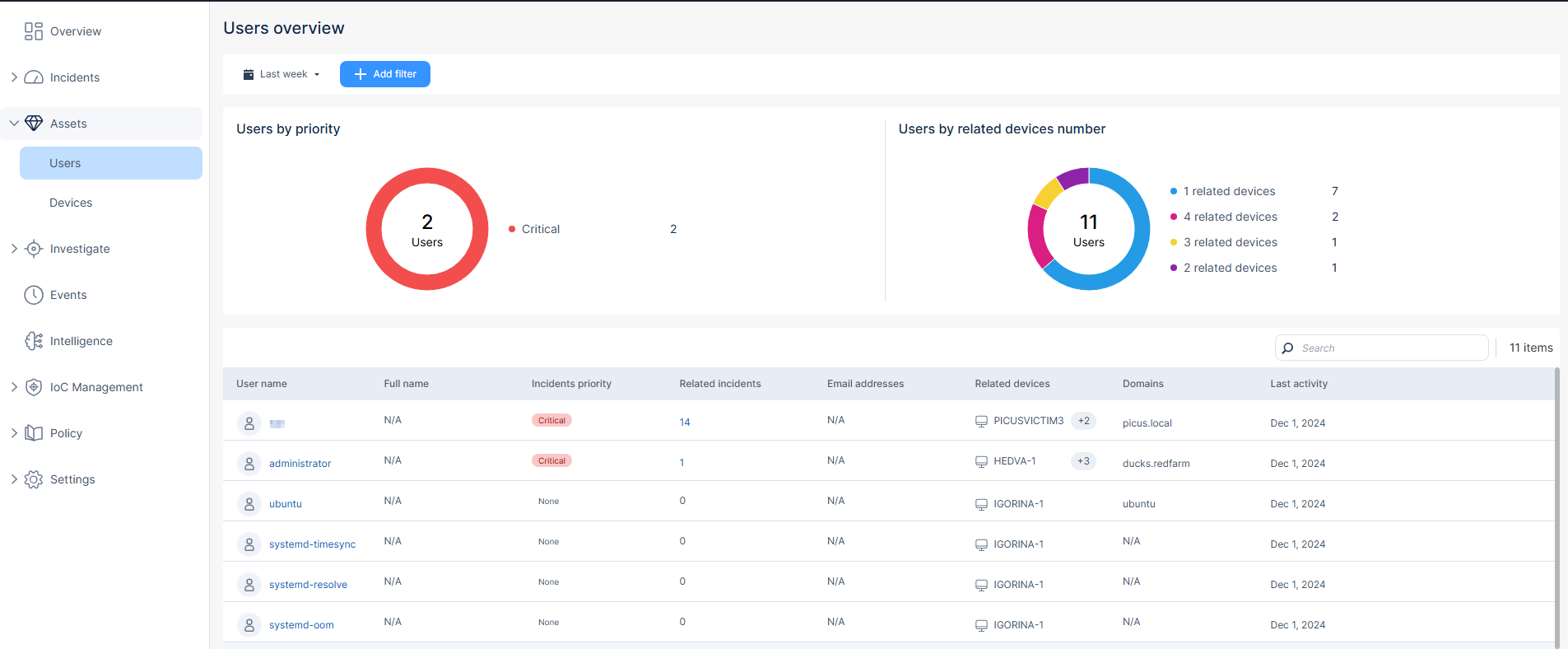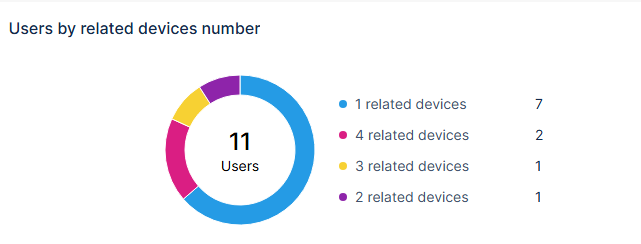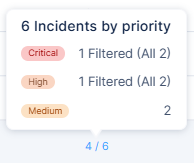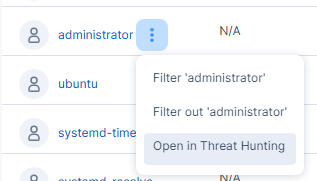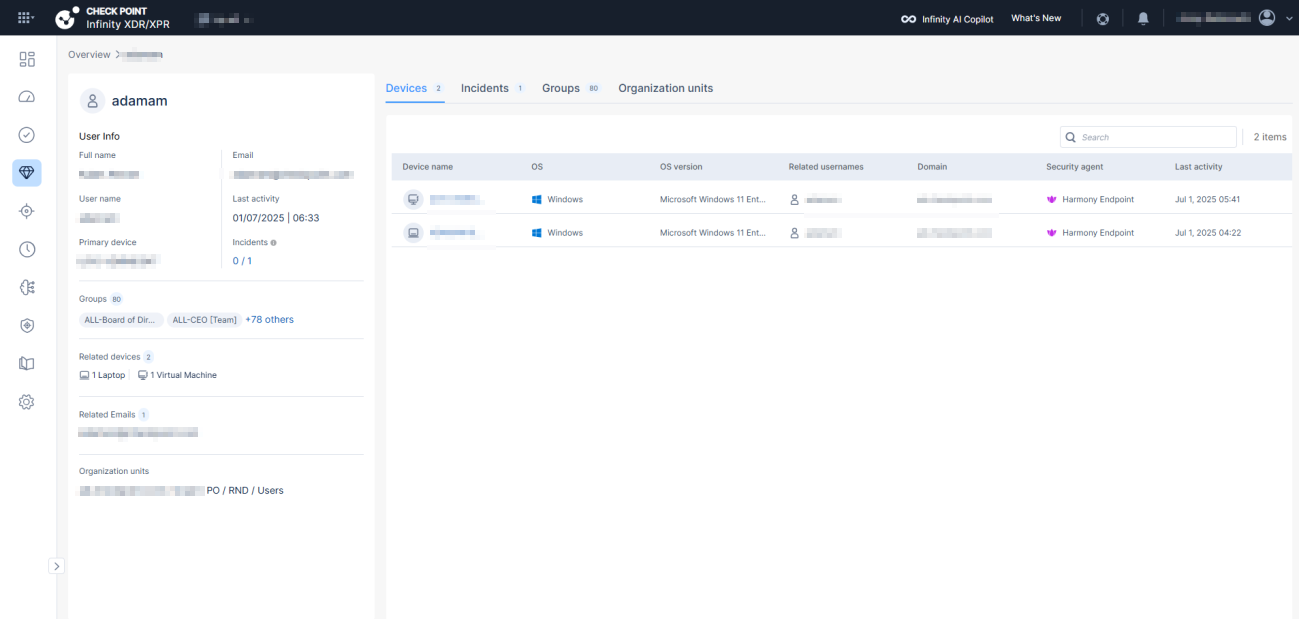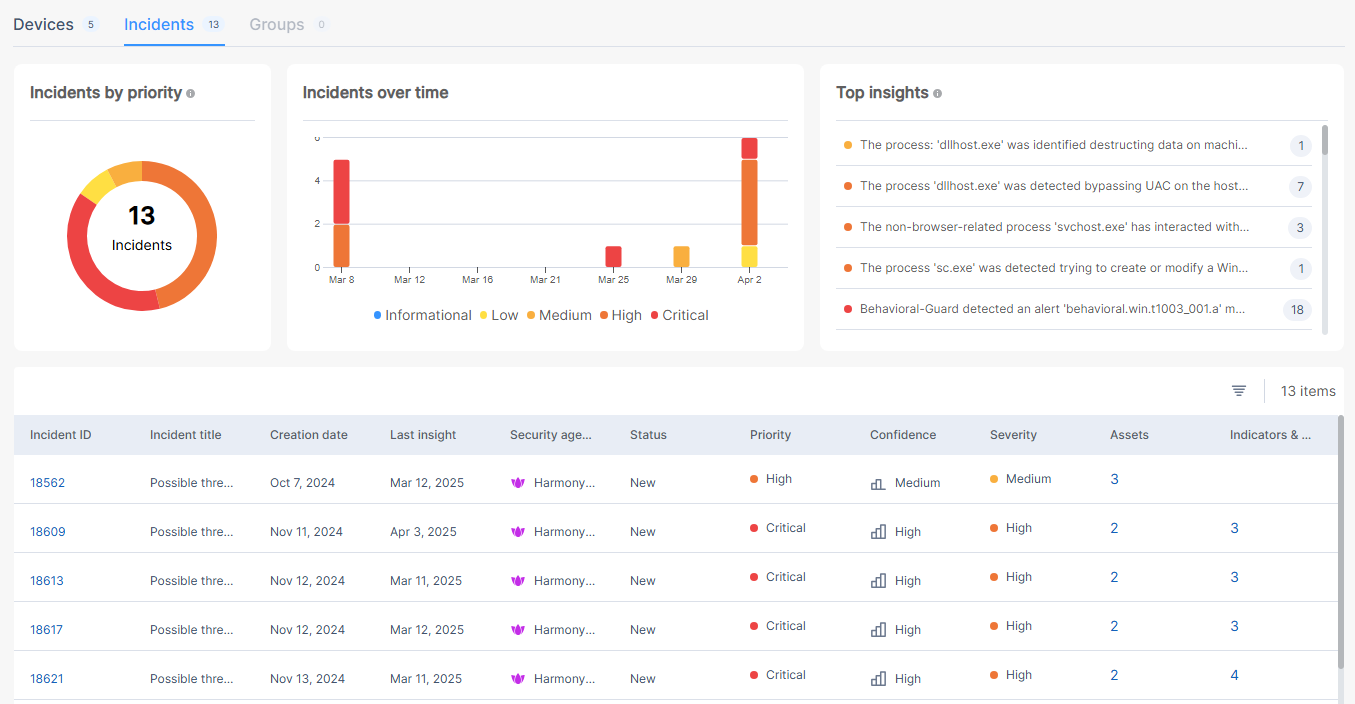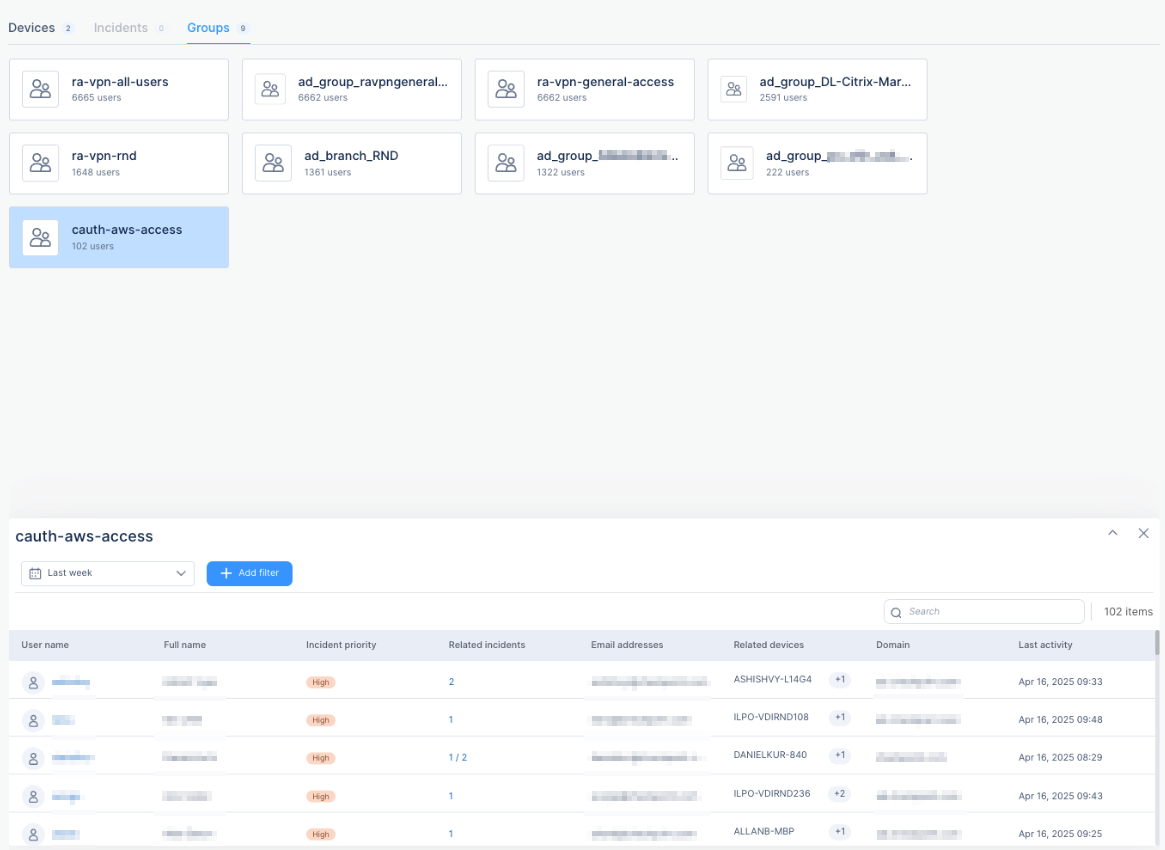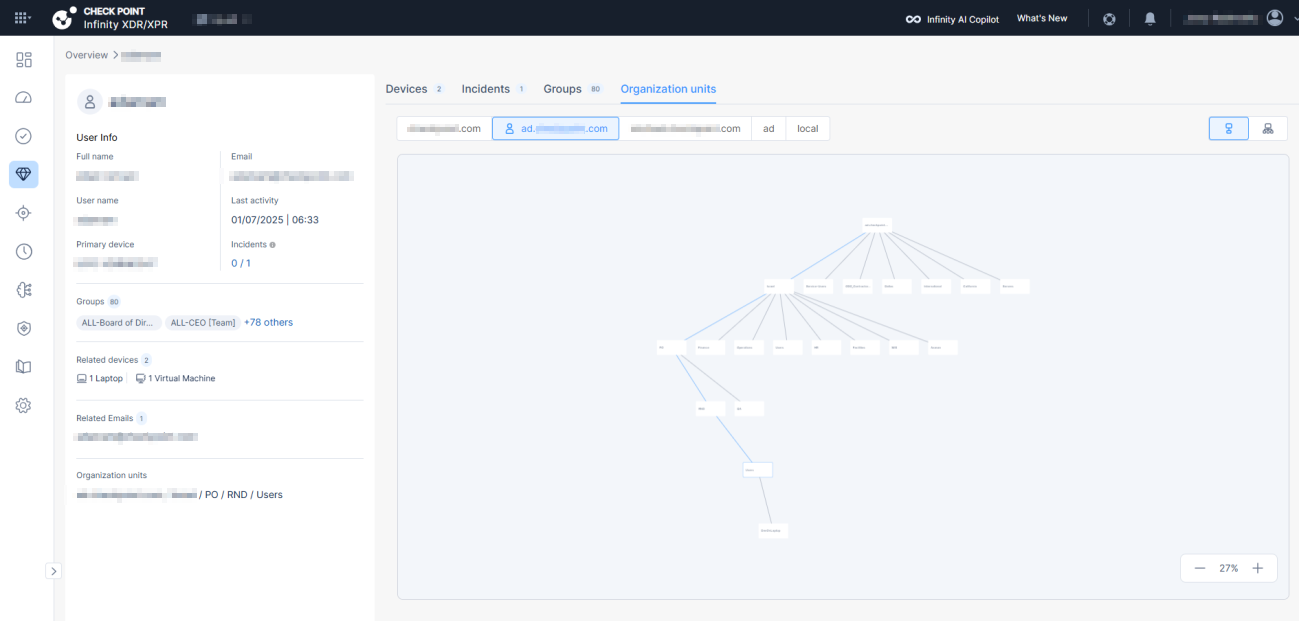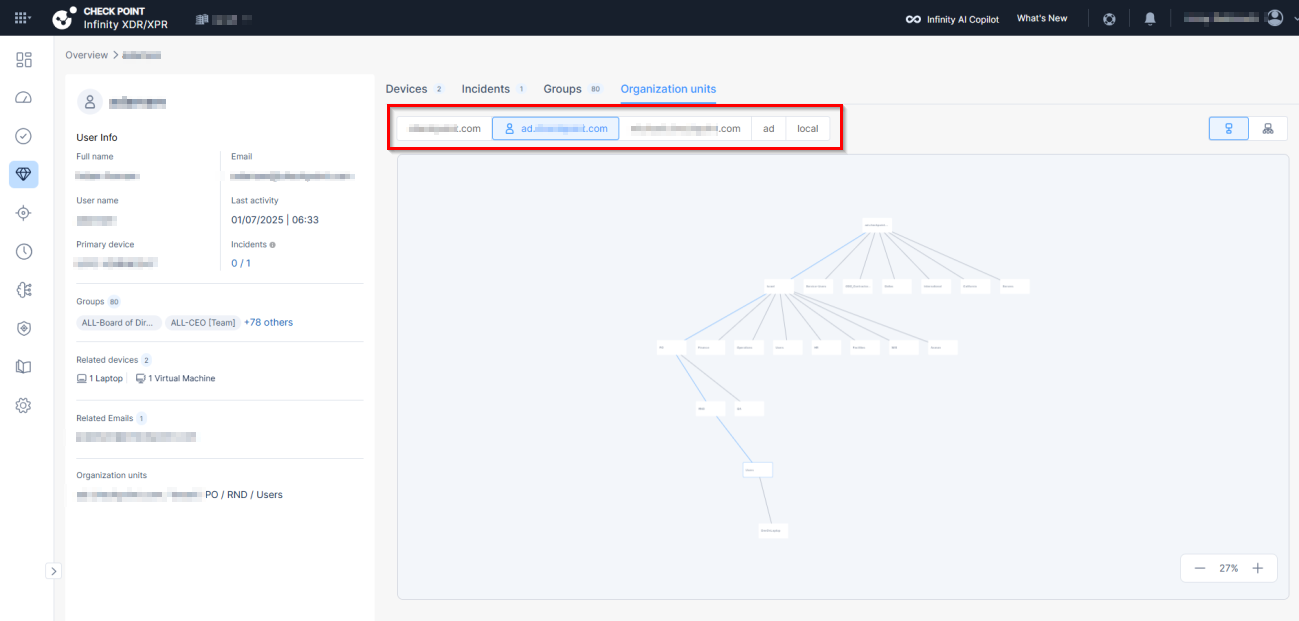Users
The Users page shows information about the user assets in your account and the details of related devices, incidents and Identity Provider (IdP) groups.
To view the Users page, access the Infinity XDR![]() Extended Detection & Response/XPR
Extended Detection & Response/XPR![]() Extended Prevention & Response Administrator Portal and click Assets > Users. By default, it shows details of users whose Last activity date is within the past seven days.
Extended Prevention & Response Administrator Portal and click Assets > Users. By default, it shows details of users whose Last activity date is within the past seven days.
Users by Priority
The Users by priority widget shows the number of users based on the priority level of the incidents they are involved in, within the selected time period.
To filter the Users overview page according to a specific priority level, click the relevant section on the pie chart. The system filters the page based on your selection and adds this filter to the Filter list.
Users by Related Devices Number
The Users by related devices number widget shows the total number of users and the statistics of related devices, within the selected time period.
To view information of users with a specific device count, click the relevant section on the pie chart. The system filters the page based on your selection and adds this filter to the Filter list.
Example:
For the statistics displayed above, to view information about the two users with four related devices, click the pink section.
Users Table
The Users table is sorted by the priority of incidents related to the users. It shows:
|
Item |
Description |
||
|---|---|---|---|
|
User name |
Name of the user in the events and alerts processed by Infinity XDR/XPR. |
||
|
Full name |
Full name of the user. |
||
|
Incidents priority |
Highest priority level among all the related incidents. |
||
|
Related incidents |
Number of incidents in which the user is involved. Hover over the count to view the number of the filtered incidents (if applicable) and the total number of incidents.
To view the incidents details, click the count. The Incidents page appears. |
||
|
Email addresses |
Email address(es) of the user. |
||
|
Related devices |
Devices used by the user. |
||
|
Domain |
Domain(s) accessed by the user. |
||
|
Last activity |
Date of last activity by the user. |
To sort the table, click the ![]() icon in the Incidents priority column.
icon in the Incidents priority column.
To search for a specific user in the table, enter the user name in the Search field.
Filtering the Users Page
You can filter the information on the Users overview page for different time periods. The system shows information of users whose Last activity time is within the selected time period.
Adding Filters
To add a new filter:
-
Click + Add Filter.
-
Enter these details:
-
Field - Select the user field.
-
Operator - Select the operator to be applied.
-
Value - Select the value of the user field.
-
-
Click Save.

Note - You can add multiple filters.
The system updates the Users overview page based on all the active filters.
|
|
Note - You can define the filters below to specify the incidents to be considered to determine the Incident priority and Related incidents:
|
Filter In and Filter Out in Users Table
You can filter the Users overview page by either including (Filter) or excluding (Filter out) specific user fields in the Users table. To do that, hover over the field and click the  icon and then select the required option.
icon and then select the required option.
User Threat Hunting Details
To view the Threat Hunting details for the user:
-
Hover over the user name and click the
 icon.
icon. -
Click Open in Threat Hunting.
The Threat Hunting page appears and displays the Threat Hunting details for the user.
User - Related Devices, Incidents, Identity Provider (IdP) Groups and Organizational Unit
To view the devices, incidents and Identity Provider (IdP) groups related to a user, click the user name in Users table. The system shows:
User Details
The User Info section displays the user details.
The User Info section shows:
|
Item |
Description |
|---|---|
|
Full name |
Full name of the user. |
|
|
Email address of the user. |
|
User name |
Name of the user in the events and alerts processed by Infinity XDR/XPR. |
|
Last activity |
Date and time of last activity by the user. |
|
Primary device |
Main device the user uses. |
|
Incidents |
Number of incidents in which the user was involved during the past 30 days. |
|
Groups |
The Identity Provider (IdP) groups in which the user is a member. |
|
Related devices |
Devices the user has logged into. |
|
Related Emails |
Email addresses used by the user. |
Users - Device Details
The Devices tab displays the devices used by the user.
The Devices table shows:
|
Item |
Description |
|---|---|
|
Device name |
Name of the device. |
|
OS |
Operating System on the device. |
|
OS version |
Operating System version. |
|
Related usernames |
Users who have used the device. |
|
Domain |
Domains accessed on the device. |
|
Security agent |
Security agent running on the device. |
|
Last activity |
Date of last activity on the device. |
To view more information about a device, click the device name.
Users - Incident Details
The Incidents tab displays the incidents in which the user was involved.
The Incident tab shows:
-
Incidents by priority - Number of incidents in which the user was involved during the past 30 days, based on their priority.
-
Incidents over time - Timeline of incidents during the past 30 days. Incidents are color-coded based on the priority levels.
-
Top insights - Top insights in which the user was involved during the past 30 days.
-
Incidents table:
Item
Description
Incident ID
ID of the incident.
To view more information about an incident, click the ID. The Incidents - Overview page appears.
Incident title
Title of the incident.
Creation date
Date on which the incident was generated.
Last insight
Date when the last insight was created for the incident.
Security agents
Security agent(s) running on the device
Status
Status of the incident.
Priority
Priority level of the incident.
Confidence
Confidence level of the security event detection.
Severity
Severity level of the incident.
Assets
Number of affected assets in the incident.
To view the asset details, click the count link. The Incidents - Affected Assets page appears.
Indicators & Artifacts
Number of indicators and artifacts involved in the incident.
To view more details on the indicators and artifacts, click the count link. The Incidents - Indicators & Artifacts page appears.
To filter the Incidents table, click the
 icon.
icon.
Users - Group Details
The Groups tab displays the Identity Provider (IdP) groups in which the user is a member. Each group card displays the number of users in that IdP group.
To view details of the users in an IdP group, click the group card. The system displays the Users table for that IdP group at the bottom of the page.
By default, it shows details of users whose Last activity date is within the past seven days.
To filter the Users table, see Filtering the Users Page.
Users - Organizational Units Tree Details
The Organization Units tab displays the full Organizational Unit (OU) hierarchy for assets in the platform.
The Organizational units tab shows:
-
A tree structure of OUs.
-
Where the asset is located within your organization’s structure.
-
User Info section:
Item
Description
Full name Full name of the user. User name Name of the user in the events and alerts processed by Infinity XDR/XPR. Primary device Main device the user uses. Email Email address of the user. Last activity Date and time of last activity by the user. Incidents Number of incidents in which the user was involved during the past 30 days. Groups
The Identity Provider (IdP) groups in which the user is a member.
Related devices
Devices the user has logged into.
Related Emails
Email addresses used by the user.
Organization units
Displays the user’s path in the organization's hierarchy, for example,
acme.com/Internationsal/India/NPO/Users.
|
|
Notes: |

